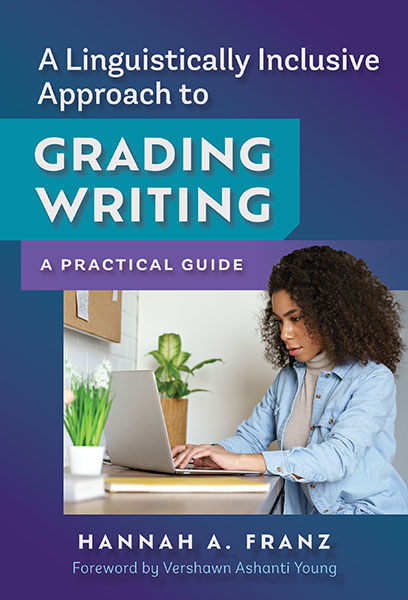Professors: Request an Exam Copy
Print copies available for US orders only. For orders outside the US, see our international distributors.
Foreword by: Vershawn Ashanti Young
Publication Date: June 28, 2024
Pages: 160

Improve your grading and feedback practices to benefit your students and their writing development. This guide models a research-based, linguistically inclusive approach to grading writing so that you can incorporate equitable assessment and feedback into your everyday practice. A linguistically inclusive grading approach honors Black linguistic justice, facilitates students’ use of feedback, and guides students to make rhetorical linguistic choices. Additionally, students will develop skills for responding to organization, word choice, grammar, and mechanics rooted in African American English and other language varieties. Example comments and practices are included throughout the book to assist instructors, including those constrained by mandated grade weighting or rubrics that preclude adopting more extensive changes. A Linguistically Inclusive Approach to Grading Writing will benefit writing instructors across contexts, including teaching online, teaching high-achieving students, and using contract grading.
Book Features:
Hannah A. Franz is the program associate for graduate advisement at the Jack Kent Cooke Foundation, and a coauthor of The Indispensable Guide to Undergraduate Research: Success in and Beyond College.
“Franz’s book fills a necessary gap, as it offers teachers direction and plans for assessing student writing. It does so by advancing an important undervalued point: Attending to the linguistic variations of all students is better and beneficial for all student writers.”
—From the Foreword by Vershawn Ashanti Young, director of Black Studies and professor of Communication Arts and English language and literacy, University of Waterloo
“Direct attention to writing in higher education is long overdue. This book is an immediate and comprehensive resource for instructors across disciplines, offering clear tools and practical strategies for grading student writing in empirically informed, inclusive, and equitable ways.”
—Christine Mallinson, Lipitz Distinguished Professor of the Arts, Humanities, and Social Sciences and professor of language, literacy, and culture, University of Maryland, Baltimore County (UMBC)
Contents
Foreword Vershawn Ashanti Young vii
Acknowledgments xiii
1. Introduction to a Linguistically Inclusive Approach to Grading Writing 1
Language Variation and a Linguistically Inclusive Approach to Grading Writing 2
The Time It Takes to Grade 3
What Motivated Me to Write This Book 4
Sociolinguistic Concepts That Inform This Book 6
The Benefits of a Linguistically Inclusive Approach to Grading 8
Is a Linguistically Inclusive Grading Approach for Me? 10
Multicultural Education and Culturally Sustaining Pedagogy 13
The Significance of Grades 17
Historical Context of Grading Writing 20
Study Backdrop 22
Companion Resources 22
Overview of the Book 23
Self-Assess Your Practices 24
2. Curriculum and Instruction for a Linguistically Inclusive Grading Approach 25
Course Objectives in Support of Linguistically Inclusive Grading 25
Instructor Motivations and Linguistically Inclusive Grading 30
Instruction in Organization and Grammar 34
Assignment Goals and Language Variation 39
Audience 41
Self-Assess Your Practices 44
Linguistically Inclusive Practices 45
3. Linguistically Inclusive Grading Processes 46
Consider Grading Priorities and Distribution 46
Align Grading Priorities With Instruction 48
Read for Student Meaning 51
Use and Explain Sociolinguistically Informed Grading Criteria 52
Word Grading Criteria Positively 56
Maximize Peer Feedback and Multiple Drafts 57
Pose Questions Rather Than Penalties 60
Self-Assess Your Practices 60
Linguistically Inclusive Practices 61
4. Linguistically Inclusive Commenting Strategies 63
Reapportion Your Time 64
Use Feedback as a Conversation 65
Teach Through Specific Positive Comments 66
Communicate High Expectations 69
Highlight Your Subjectivity as a Reader and Acknowledge Multiple Audiences 71
Ask Strategic Questions 73
Contextualize Prescriptive Comments 74
Rethink Labels 77
Use Corrections Judiciously 79
Self-Assess Your Practices 81
Linguistically Inclusive Practices 82
5. Organization and Word Choice 84
Organization and Topic Relationships 85
Respond to Organization and Topic Relationships in a Linguistically Inclusive Approach 88
Pronoun Choice 92
Respond to Pronoun Choice in a Linguistically Inclusive Approach 94
Formal and Informal Word Choice 96
Respond to Formal and Informal Word Choice in a Linguistically Inclusive Approach 98
Self-Assess Your Practices 100
Linguistically Inclusive Practices 100
6. Grammar and Mechanics 102
What Exactly Are Grammar and Mechanics? 102
Grammar Patterns 104
Respond to Grammar Patterns in a Linguistically Inclusive Approach 108
Mechanical Features 113
Self-Assess Your Practices 116
Linguistically Inclusive Practices 117
7. Putting It All Together 119
A Linguistically Inclusive Approach to Grading: Summarized 120
Application of Multicultural Education and Culturally Sustaining Pedagogy 122
What Can a Linguistically Inclusive Grading Approach Look Like in Your Classroom? 123
Conclusion 131
References 132
Index 140
About the Author 145
Professors: Request an Exam Copy
Print copies available for US orders only. For orders outside the US, see our international distributors.